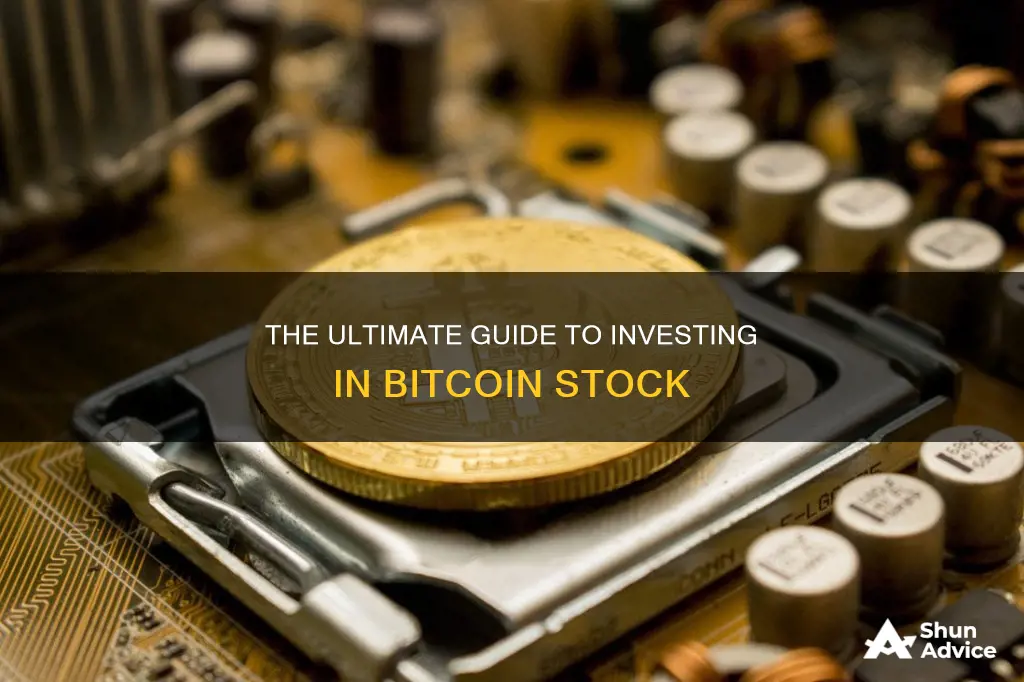
Bitcoin is a popular type of cryptocurrency that utilizes a large chain of interconnected computers to store and protect your digital assets. It is a highly volatile asset that's prone to large and fast swings in value, which presents an opportunity for large returns but also poses a tremendous risk.
There are several ways to invest in Bitcoin, both directly and indirectly. You can invest in a company that utilizes Bitcoin technology, or participate in Bitcoin mining. You can also buy standalone Bitcoin, or invest in Greyscale's Bitcoin Investment Trust, Amplify Transformational Data Sharing ETF, or Bitwise 10 Private Index Fund.
If you're looking to invest in Bitcoin, it's important to do your research and understand the risks involved. Bitcoin is a very high-risk investment due to its volatile nature, and there are no guarantees of big returns. It's also important to diversify your investment portfolio and start small to minimize risk.
When investing in Bitcoin, you'll need to use a crypto exchange to buy and sell, and you'll need a Bitcoin wallet to store your coins. Some popular crypto exchanges include Coinbase, Binance, Kraken, and Gemini. For Bitcoin wallets, you can choose between a hot wallet, which is operated by a crypto exchange or provider, or a cold wallet, which is a physical hardware device that stores your coins.
Remember to always do your own research and understand the risks before investing in Bitcoin or any other cryptocurrency.
What You'll Learn

Choosing a Bitcoin exchange
- Reputation: Research the reputation of the exchange by reading reviews and checking forums such as Reddit or BitcoinTalk. A reliable exchange with a good track record can help ensure the safety of your investments.
- Fees and Payment Options: Different exchanges charge varying fees for deposits, transactions, and withdrawals. It is essential to understand all the fees involved before joining an exchange. Additionally, consider the payment options available, such as bank accounts, wire transfers, e-wallets, or bank cards, and choose an exchange that suits your preferences.
- Verification Requirements: Most exchanges require ID verification to comply with regulatory requirements and prevent fraud. This process may take a few days, so plan accordingly.
- Geographic Location: Some exchanges have geographic restrictions, so ensure the platform you choose allows full access from your country of residence.
- Exchange Rate: Exchange rates can vary by up to 10% between platforms, so it is worth shopping around for the best rates.
- Security: As Bitcoin wallets and exchanges are attractive targets for hackers, prioritize exchanges that prioritize security and have a good track record in this regard.
- Trading Tools and Interface: Consider the range of trading tools and the user-friendliness of the interface, especially if you are a beginner.
- Customer Support: Opt for an exchange with reliable and responsive customer support to assist you with any issues that may arise.
- Cryptocurrency Pairs: If you plan to trade multiple cryptocurrencies, look for an exchange with a wide range of trading pairs.
Some popular Bitcoin exchanges include:
- Coinbase: A well-known and trusted exchange with a user-friendly interface. It offers insurance against security breaches and supports various currencies.
- Binance: A good option for experienced traders, offering a large selection of cryptocurrencies and low trading fees.
- Kraken: The world's largest Bitcoin exchange with a vast selection of cryptocurrencies and funding methods. It also has a pro version with advanced trading tools.
- Gemini: Founded by the Winklevoss twins, Gemini has low fees and a clean user interface. It supports several currencies and offers real-time market limit orders.
- CEX.IO: A multifunctional exchange that allows users to buy Bitcoin with a credit or debit card. It offers multiple payment options and 24/7 customer support.
Bitcoins in India: Safe Investment or Risky Business?
You may want to see also

Funding your account
Choose a Crypto Exchange:
Select a crypto exchange that suits your needs, considering factors such as security, fees, ease of use, and the range of cryptocurrencies offered. Some popular options include Coinbase, Binance, Kraken, Gemini, and Bitfinex.
Connect Your Bank Account:
Link your bank account to your chosen crypto exchange. This will enable you to purchase Bitcoin and other cryptocurrencies. You may also have the option to connect a debit or credit card, but be mindful of the higher fees associated with credit card transactions.
Fund Your Account:
Transfer funds from your bank account to the crypto exchange. This will allow you to start investing in Bitcoin and other cryptocurrencies offered by the exchange.
Place Your First Order:
Once your account is funded, you can place your first order to buy Bitcoin or other cryptocurrencies. Depending on the platform, you may be able to purchase by tapping a button or entering the ticker symbol (BTC for Bitcoin).
Store Your Bitcoin:
After purchasing Bitcoin, consider how you want to store it. You can use a "hot wallet," which is an online wallet provided by the exchange or a third party, or a "cold wallet," which is an offline storage method like a hardware device or paper wallet.
Remember to always do your research, understand the risks involved, and make sure you are comfortable with the platform and storage method you choose.
A Beginner's Guide: Invest in Bitcoin with TD Ameritrade
You may want to see also

Connecting your exchange to a payment option
Once you've chosen a crypto exchange, the next step is to link your account to a payment source, such as a debit card or bank account. Each exchange has different fees and fund settlement times depending on how you choose to fund your account, so it's important to choose the best payment option for your needs.
At most exchanges, you can connect your bank account directly or link it to a debit or credit card. Although you can use a credit card to purchase cryptocurrency, crypto price volatility could inflate the overall cost of purchasing a token when combined with a credit card's interest charges. Bitcoin is legal in the U.S., but some banks may question or even stop deposits to crypto-related sites or exchanges.
Fees vary for deposits via a bank account, debit, or credit card, and exchanges also charge fees per transaction. It's important to research the fees associated with different payment methods before deciding how to connect your exchange to a payment option.
Additionally, it's worth noting that while you can use a credit card to buy Bitcoin, credit card processing can add extra charges to these transactions. Credit card issuers treat Bitcoin purchases as cash advances and charge hefty fees and interest rates. Therefore, using a debit card or bank account may be a more cost-effective option.
When connecting your exchange to a payment option, it's crucial to prioritize security. Enable two-factor authentication and use strong passwords to protect your account. Also, be cautious when sharing your personal and financial information with the exchange.
The Ultimate Guide to Investing Money in Bitcoin
You may want to see also

Placing your first order
Once you've chosen an exchange, you'll need to fund your account before placing your first order. Check if your chosen exchange has a Bitcoin wallet built into its platform. If not, you'll need to find one of your own.
When your account is funded and you have a wallet, you can place your first order to buy Bitcoin. Depending on the platform you're using, you may be able to purchase Bitcoin by tapping a button, or you may have to enter Bitcoin's ticker symbol: BTC.
Next, input the amount you want to invest. If Bitcoin's current price is around $40,000, you'd need to invest that much to buy 1 BTC. If you invested less, say $1,000 when 1 BTC equals $40,000, you'd get a percentage of a Bitcoin equal to about 0.025 BTC.
There are several types of orders to choose from. Market orders are the easiest to understand for new investors. They are also the simplest type of crypto order. With a market order, you only need to specify the amount of the asset you would like to buy or sell. The price will be determined by the current rates available on the order books.
Limit orders, on the other hand, require the input of a precise order price and amount. Limit orders may ensure a more favourable fill price on average compared to market orders. However, there is no guarantee that they will be completely filled or filled at all.
Another option is a stop-limit order, which combines the benefits of limit and stop orders. This type of order is used to execute precise limit orders once a specific price point has been met by the market.
Where to Invest in Bitcoin Stock
There are several places where you can invest in Bitcoin. You can purchase Bitcoin from cryptocurrency exchanges such as Gemini, Kraken, Coinbase, and Crypto.com. These exchanges carry a variety of fees and consumer protections, so be sure to do your research before choosing.
Another option is to use a traditional stockbroker like Robinhood, Webull, TradeStation, or Fidelity. The choices among traditional brokers that give customers a way to buy and sell Bitcoin are few, and they may not be available in your country.
You can also buy Bitcoin using peer-to-peer money transfer apps like PayPal, Venmo, or Cash App, or from a Bitcoin ATM.
Beginners Guide: Earning Bitcoin Without Investment
You may want to see also

Storing your Bitcoin
Once you've decided to invest in Bitcoin, you'll need to consider how to store it. As a digital asset, Bitcoin can be very unintuitive to store safely. In the past, many people have lost their coins, but with proper understanding, these risks can be eliminated. If your bitcoins are lost or stolen, it's almost impossible to get them back.
Hot Wallets vs Cold Wallets
Bitcoin can be stored in two kinds of digital wallets: a hot wallet or a cold wallet. With a hot wallet, transactions are generally faster, and your Bitcoin is stored by a trusted exchange or provider in the cloud. It is accessed through an app or computer browser on the internet. Any trading exchange you join will offer a free Bitcoin hot wallet where your purchases will be automatically stored. However, many users prefer to transfer and store their Bitcoin with a third-party hot wallet provider, which is also typically free to download and use.
While advocates say the blockchain technology behind Bitcoin is even more secure than traditional electronic money transfers, Bitcoin hot wallets are an attractive target for hackers. As such, it's recommended that hot wallets are only used for small amounts of cryptocurrency or crypto that is actively being traded on an exchange.
Cold wallets are small, encrypted portable devices that allow you to download and carry your Bitcoin. They are not connected to the internet and are, therefore, less vulnerable to being compromised. They are considered much more secure than hot wallets and can cost less than $100. Cold wallets are best for long-term storage of large amounts of Bitcoin.
Types of Wallets
There are generally two categories of storage, custodial and non-custodial, and four types of wallets: desktop, mobile, hardware, and web-based.
- Desktop wallet: a program that resides on your computer. Not the safest storage method.
- Mobile: a program that is hosted on a mobile device. Not very secure.
- Hardware: a device similar to a USB drive. Secure, depending on if it is connected and how it connects to another device.
- Web-based: a wallet that is hosted by a web service. Not secure, as you're letting someone else store your keys for you.
Whether a wallet is connected to or resides on the internet determines whether it is a hot or cold wallet.
Best Practices for Storing Bitcoin
- Only keep what you plan to use in your hot wallet. Once you're done with your transaction, move your crypto back to cold storage.
- Back up your entire bitcoin wallet early and often.
- Keep your software up to date. A wallet running on non-updated software can be a soft target for hackers.
- Use a strong password and two-factor authentication.
- Have your wallet create a seed phrase, write it down on paper, and store it in a safe place (or several safe places, as backups).
- If you have the option of using multi-sig, ensure you know the other people and trust them before joining the wallet.
- If you intend to store a very large amount of bitcoins, for example, in a business, you should consider paying for security consulting.
Bitcoin Investment: Safe or Risky Bet?
You may want to see also
Frequently asked questions
You can buy Bitcoin stock by signing up for a reliable exchange, verifying your identity, and funding your account. From there, you can set your own market limit orders to buy Bitcoin.
A Bitcoin Stock Exchange is a trading platform where people can access real-time prices to freely buy, sell or exchange Bitcoin with other virtual currencies or traditional fiat currencies.
The best Bitcoin exchange platform depends on your needs. For beginners, Coinbase is a great platform to get your foot in the door with Bitcoin stock trading. For experienced traders, Binance is a good option as it has high volumes and low fees when compared to most other exchanges.







